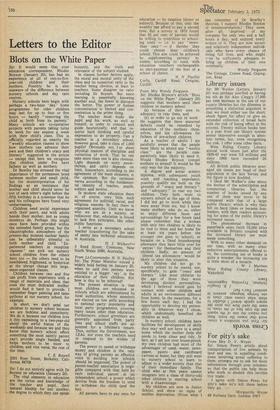From Lt-Commander H. N. Paulley Sir: The Prime Minister voiced
a widely held feeling on January 25, when he said that parents were entitled to a bigger 'say ' in the education of their children. But how is this to be achieved?
The present situation is that most children are educated at schools which are administered by local authorities, whose members are elected on low polls according to national party popularity and local party programmes, covering many issues other than education. Furthermore, school governors are generally appointed from party lists and school staffs are appointed for a lifetime's tenure. Thus, neither the Government, nor LEAs, nor even the teachers need to respond to the wishes of parents.
The power to spend or withdraw money and children is the only way of giving parents an effective voice in deciding how schools should be organised. The power of parent-teacher association is negligible compared with that held by each individual parent at an independent school: a power which derives from the freedom to send or withdraw the child (and the fee).
All parents have to pay once for education — by taxation (direct or indirect). Because of this, only the wealthy can afford to pay a second time. But a survey in 1970 found that 55 per cent of parents would be willing to contribute to schooling costs — i.e. to pay "morethan once " — if thereby they could choose their children's school. This aim could be achieved by supplementing parents' in comes, according to need, with education vouchers exchangeable as part-payment of the fees of a school of choice.
H. N .Paulley Corfu, Cardiff Road, Creigiau, Cardin'.


































 Previous page
Previous page